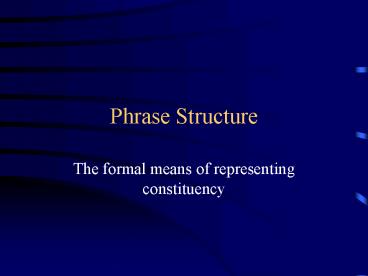Phrase Structure - PowerPoint PPT Presentation
1 / 26
Title: Phrase Structure
1
Phrase Structure
- The formal means of representing constituency
2
Constituents are hierarchically organized
- S
- NP VP
- D N V PP
- the man eats
- P NP
- at
- Adj N
- fancy restaurants
The man eats at fancy restaurants.
S NPDthe Nman VP Veats PP Pat NP
Adjfancy Nrestaurants
3
Phrase Structure Rules
- Rules to represent hierarchical structure
- eg. S ? NP VP
- S
- NP VP
constituent
(sub)constituents
4
Phrase Structure Rules
- XP ? (YP) X (ZP)
X,Y,Z are variables representing any category (eg
N, V,A, P etc)
5
Phrase Structure Rules
- NP ? (D) (AP) N (PP)
6
Phrase Structure Rules
- NP ? (det) (AP) N (PP)
7
Noun Phrases (NP)
- A noun phrase can be just a bare noun
- NP John left (cf. NP the man left)
- So all other material other than the Noun itself
will be optional. - NP ? N
8
Noun Phrases (NP)
- NPs can have an optional determiners and
adjective (phrases). - You are allowed one determiner and as many APs as
you like - slippers
- the slippers
- pink slippers
- the pink slippers
- pink fluffy slippers
- the pink fluffy slippers
- the a slippers
NP? (D) (AP) N
9
Noun Phrases (NP)
NP? (D) (AP) N
- NP
- D AP AP N
- the slippers
- A A
- pink fluffy
10
Noun Phrases (NP)
- NPs also allow as many optional PPs following the
N as you like - The book of poems
- The book of poems with the red cover
- The book of poems with the red cover from New York
NP? (D) (AP) N (PP)
Is this rule the final one? Not even close! (For
example, it doesnt have a means of incorporating
relative clauses). However, well start with this
as a working hypothesis.
11
Adjective/Adverb Phrases (APs)
- Adjectives Adverbs can stand on their own as
phrases - John left quickly
- the red lipstick
- AP ? A
- But they can also be modified by other APs
- John left rather quickly
- the very red lipstick
- AP ? (AP) A
12
Adjective/Adverb Phrases (APs)
- A situation easily confused
- The big yellow balloon
- The very yellow balloon
- What does big modify? What does very modify?
13
The Principle of ModificationThe Golden Rule
- If one constituent modifies another then those
two constituents are sisters. (ie. They must be
part of the same constituent)
14
Prepositional Phrases (PPs)
- These generally consist of a Preposition and an
NP - up the road
- on the video screen
- under the avocado
- PP?P NP
15
Prepositional Phrases (PPs)
- Is the NP in a PP optional?
- I threw the garbage out
- The construction workers blew the building up
- I havent seen him before
- PP?P (NP)
- This is controversial not everyone agrees these
are prepositions.
16
Verb Phrases (VP)
- Verbs by themselves
- Marko arrived
- Susan sang
- VP? V
- Verbs can be modified by adverbs
- Marko often sang
- Susan sang beautifully
- Luis often sang beautifully
- VP ?(AP) V (AP)
17
Verb Phrases (VP)
- Verbs modified by PPs
- Marko sang though a microphone
- Susan sang to her parents
- VP? (AP) V (PP) (AP)
- Verbs with an NP object
- Marko sang a song
- VP ?(AP) V (NP) (PP) (AP)
- Verbs with a Sentence Object
- Fred said Marko sang a song
- VP ?(AP) V (NP/S) (PP) (AP)
18
Verb Phrases (VP)
- VP ?(AP) V (NP/S) (PP) (AP)
VP AP
V NP PP
PP A got D N P
NP P NP frequently
his buckets from D N for D N
the
store a dollar
19
Clauses (Sentences)
- Sentences consist of a subject (NP) and a
predicate (VP). In English, neither is optional
(although in other languages the subject may be
omitted) - S ? NP VP
20
Clauses (Sentences)
- Sentences may have an optional auxiliary or modal
verb (of the Category T) - S ? NP (T) VP
21
Embedded Clauses
- Sometimes clauses can function as the subject or
object of other clauses. - I asked if Maria would eat the spaghetti
- I think that Maria decked the Janitor
- That Maria decked the Janitor is obvious
- Words like that and if are called
complementizers. - S'?(Comp) S
22
Embedded Clauses
- VP?(AP) V (NP/S') (PP) (AP)
- S ?NP/S' (T) VP
23
S
NP
VP
T
didnt
D N V
S
the syntactician think
Comp S
that
NP VP
D N V NP
the phonologist said
D N
the sentence
24
Recursion
- Language is infinite you can say sentences that
have never been said before. - NP ? N PP
- PP ? P NP
This property is called Recursion
25
Summary
- Constituency hierarchical structure is captured
by phrase structure rules (PSRs) - These rules also capture the recursive (infinite)
property of language.
26
PSRs of English
- S' ?(Comp) S
- S ?NP/S' (T) VP
- VP?(AP) V (NP/S') (PP) (AP)
- NP ?(D) (AP) N (PP)
- PP ? P (NP)
- AP ? (AP) A
to be significantly revised































